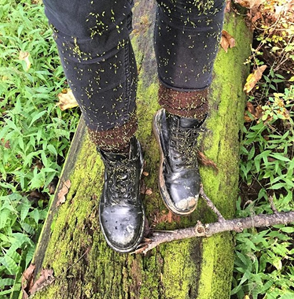Intentional Living, Part 1
- Lindsay Houghton
- Apr 24, 2017
- 3 min read

Baby steps, I tell myself as I reach for a paper towel for probably the tenth time today and it’s not even noon. Unlearning everything we’ve been programmed to do, like using paper towels instead of re-usable cloth to clean a mess or dry our hands is a challenge. But it’s one myself and many others are starting to take on. Two of my colleagues are at different points in their journey in this mindful quest for a less wasteful life, I’ve asked them to contribute their thoughts on the matter.
How to Begin
by Lauren Merrill, esthetician + aromatherapist at THE pearl

In a world that has become so stamped with unsettling environmental health statistics, it is easy to become overwhelmed when thinking about our individual role in healing the planet. It’s best to focus on baby steps, introducing simple yet powerful ways to leave more of a green footprint in our daily lives. Mindfulness and intentional living are moving to the forefront, and people are demanding a better and healthier future. In my mind’s eye I envision a world that our grandchildren will be proud to call home.

Ask yourself: “What kind of ancestor do I want to be?”
The right to easy access of wild places, breathable air, clean water, pure food, and abundant natural resources is something we all must defend. Here are a few ideas to help us in the process:
1. Support Local Business and Companies Making Green Choices.
Feel good about where your money is going. Support your local farmer's market and health food store for organic produce. Help minimize the power struggle between big business and the public. When we support companies with good agendas, we are using our money to circulate positive action. Research your favorite brands and see what their overall social and environmental records are like.
(Among the best: Seventh Generation, Eden Foods, Organic Valley, Clif Bar, Honest Tea, Patagonia, Tom’s of Maine, Ben & Jerry’s)

2. Reduce and Reuse.
Investing in items that are reusable saves both your pocket book and the environment! Try converting common plastics like straws, water bottles, and silverware into stainless steel and wooden options. There are many reusable kits and items available for the aspiring minimalist. Check out Nalgene and Klean Kanteen for attractive and eco-friendly water bottles, and consider replacing sandwich bags for lunch with tupperware and glassware.

3. Carpool, Bike, Walk!
A lot of these pieces of advice are inspired from the “olden days” of how people used to live before the modern fast-paced era. Sustainability is not necessarily a progressive concept, but a matter of learning from simpler times. When was the last time you carpooled with a co-worker nearby or biked to the store? It may seem inconvenient, but it does make more sense. Not only is it better for the environment, but it does form a greater sense of self-sufficiency and provide a healthy change to your normal routine.
4. Immerse Yourself in Nature.
Appreciation for the natural world is what ignites the inner fire to help save it. When there is something we love on a deep level, we do everything we can to protect it. The wild landscapes of the earth are where we have spent most of our history, and being in nature has a homing effect on the mind and body. Within a culture that battles with enormous levels of stress and anxiety, time spent outdoors is a medicine that we are in need of. Start a garden, go for daily walks, stargaze, sit by a body of water, take a moment to stop and smell the roses. This beautiful world is constantly offering itself to us.

5. Share.
Between us all, there is more than enough to go around. Often times our inner consumer craves an item in the moment, even if we already have it. Next time you are itching for a new outfit for a special occasion, reach out to a friend! It’s a great feeling to have an abundance of choices, free of cost. Also never underestimate the unique finds that are often waiting for you on thrifty, vintage second-hand store rack!
Rather than going to the store for one missing ingredient of a recipe, why don’t we ask our close neighbor instead? There are so many instances where we just buy something new, never planning to use it in its entirety, when we could borrow it from friends and family. This spirit of community is incredibly empowering, as it focuses on sharing resources among all people within it.
Further Reading Materials:
Do One Green Thing by Mindy Pennybacker
The Joy of Less: A Minimalist Guide to Declutter, Organize, and Simplify by Francine Jay
Green Made Easy: The Everyday Guide for Transitioning to a Green Lifestyle by Chris Prelitz















Comments